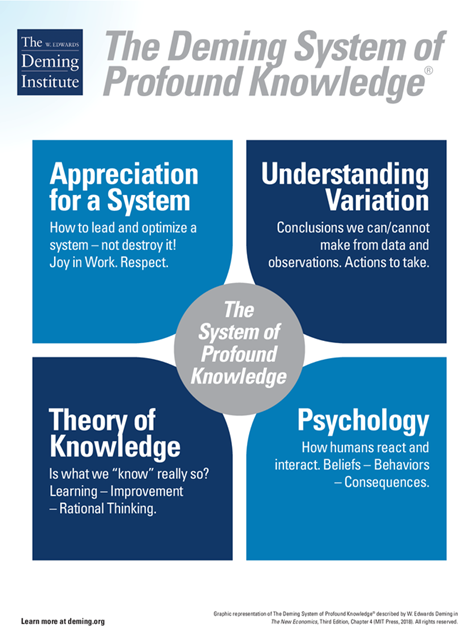Online Course
NURS 834 - Translating Evidence to Practice
Module 8: Understanding Variation and Identifying Quality Indicators
Theory of Profound Knowledge
First defined by American physicist. Edwards Deming, a system of profound knowledge includes familiarity with variations, such as common cause and special variation, as well as the interconnectivity of systems, psychology and other motivating factors, and theory related to the learning process.
This theory’s four components further include: appreciation of a system, knowledge of variation, theory of knowledge, and knowledge of human behavior.

Two brief (< 3 minutes) whiteboard videos illustrate Deming’s Theory of Profound Knowledge:
- Deming's System of Profound Knowledge: https://www.youtube.com/watch?v=xKv--YA8XJE
- Deming System of Profound Knowledge Part II: https://www.youtube.com/watch?v=gRbX1GLKs5k
W. Edward Deming on Questions:
“If you do not know how to ask the right question, you discover nothing.”
W. Edward Deming
Questions help us understand the context in which an issue occurs. Contextual factors are not always obvious. How do we approach the work of exploring the context? Finding what is important between where we are and where we want to be?
As you think about your project and your practice setting:
What do you need to know about the context that may help you?
What questions do you have?
What methods could you use to answer these questions?
Keep asking questions until the right questions emerge = Question Storming
For a refresher on common cause variation and special cause variation examining data over time click follow this link: https://www.youtube.com/watch?v=9liODQlozWQ
We will discuss more about variation in the class when we discuss run charts and statistical process control in Module 12.
This website is maintained by the University of Maryland School of Nursing (UMSON) Office of Learning Technologies. The UMSON logo and all other contents of this website are the sole property of UMSON and may not be used for any purpose without prior written consent. Links to other websites do not constitute or imply an endorsement of those sites, their content, or their products and services. Please send comments, corrections, and link improvements to nrsonline@umaryland.edu.